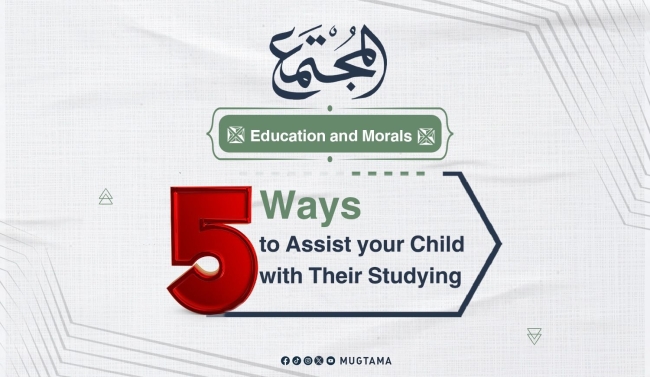With the start of the new academic year and the numerous school assignments that students are tasked with by their teachers, parents often rush to help their children complete these tasks, closely supervising the entire educational process. In some cases, they even study with them continuously and monitor all subjects alongside them.
Experts say that there are mistakes made during the process of studying with a child, which negatively affect the child's academic performance and ability to understand and retain information, possibly leading to disappointing results. One of the most prominent mistakes is the parents' constant involvement in the child's studying, assuming that the child hasn’t put in enough effort because they didn’t spend long hours studying and monitoring them constantly without considering that each child’s abilities differ from one to another.
In this context, educational experts advise:
First: It is important to encourage the child to learn and acquire information, and to engage them in discussions about the new knowledge they’ve gained. This enhances their self-confidence and motivates them to seek new information. However, it is a mistake to demand that the child achieve a certain grade and constantly chase them with questions about scores and results, ignoring the importance of learning in itself.
Second: It is a mistake to consistently help the child with their homework. Instead, it is better for the child to complete their homework and study their lessons independently, instilling a culture of self-reliance and building their confidence in their ability to complete the tasks assigned to them.
A mother can help her child start studying or answer one or two questions while they’re doing their homework, but should gradually step back and give the child the chance to complete their work independently and answer the assigned questions on their own, with small rewards or something the child likes as encouragement, but without making it a habit.
Third: Avoid any distractions during your child's study time, such as the television, phone, games, and the like. It's also not advisable to study with them on the bed, as this will make them feel lazy and inclined to sleep. Moreover, it is a mistake to chat beside them about household matters with friends or family, as this will undoubtedly distract them.
Experts, according to Al Jazeera Net, emphasize that children may lose focus and interest in studying and doing homework if they are surrounded by distractions. Thus, it is recommended to provide a conducive environment for studying in a room designed for this purpose, with a ban on games and social media apps until study tasks are completed.
Fourth: It is preferable to set a specific time frame for completing each task or activity, or to use a timer to encourage the child to complete their homework. It’s also beneficial to have a set time for studying each day, with designated breaks, such as 5 minutes of rest for every 20 minutes of studying. It’s important to encourage the child to organize their day, create a study schedule, and prioritize their tasks, ensuring that a subject they enjoy doesn’t overshadow another subject they may not like as much. Listening to their preferences about which subject they want to start with is also essential.
Fifth: Monitor your child's weak points and keep a notebook to track them without the child noticing, and follow up with their teachers, especially if they struggle with academic skills, according to the "Parenting" website.
In light of this, discussions with their teachers can help find better ways to improve their academic level or provide interactive methods that increase their love for learning, such as educational games, documentaries, trips to museums to learn about their country's history, or public parks to discover the secrets of the plant world. They can also be enrolled in a science camp or a cultural competition, which connects the child to various sciences in an enjoyable way, making studying a fun time rather than a form of punishment.
It’s also important to understand the type of learning your child prefers, whether auditory, visual, or kinesthetic. Some children learn by reading, others by writing, and some by studying out loud to help retain information if they are auditory learners. It's essential to discuss their abilities and strengths or weaknesses with their teachers.
-------------------------------------------------------------


